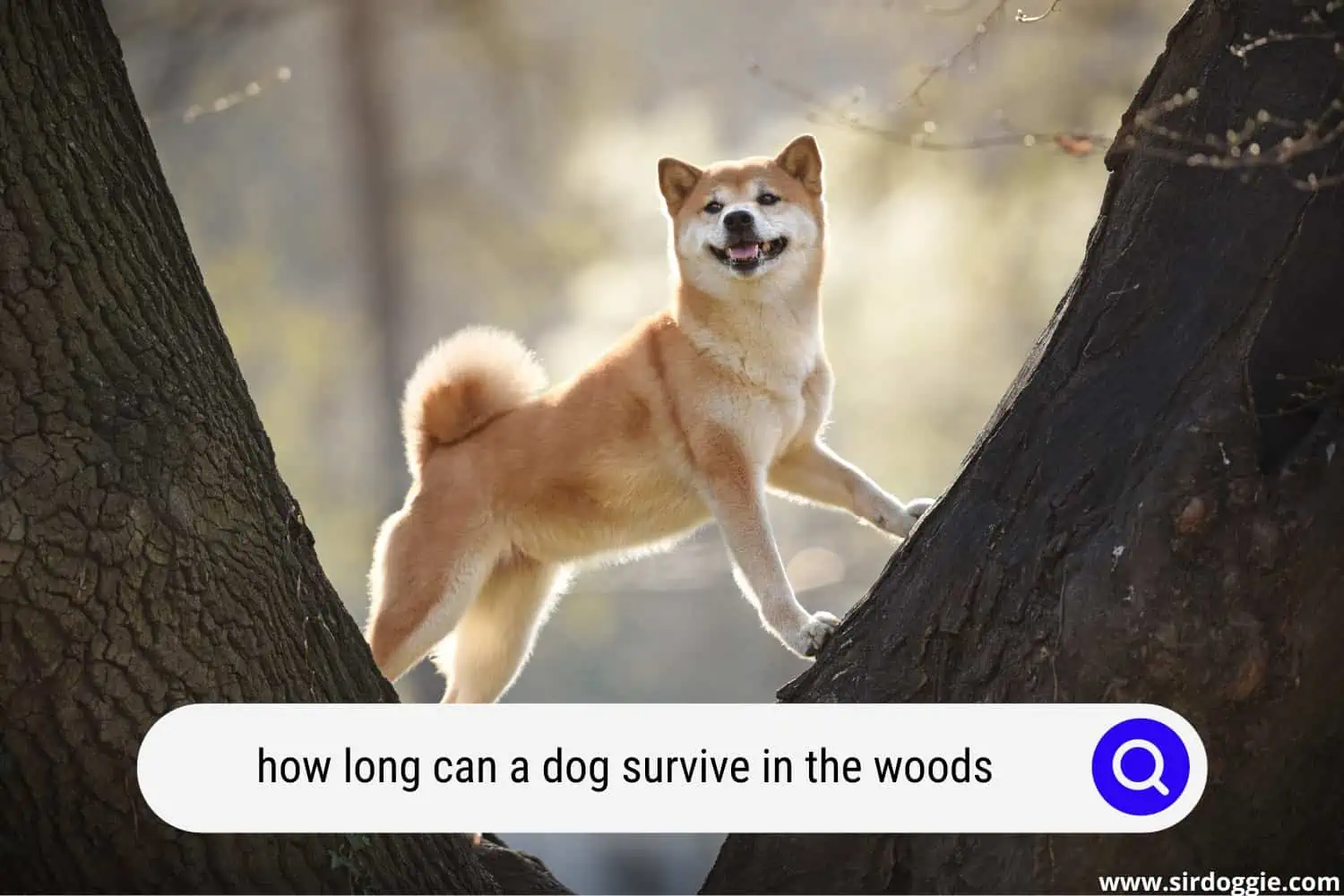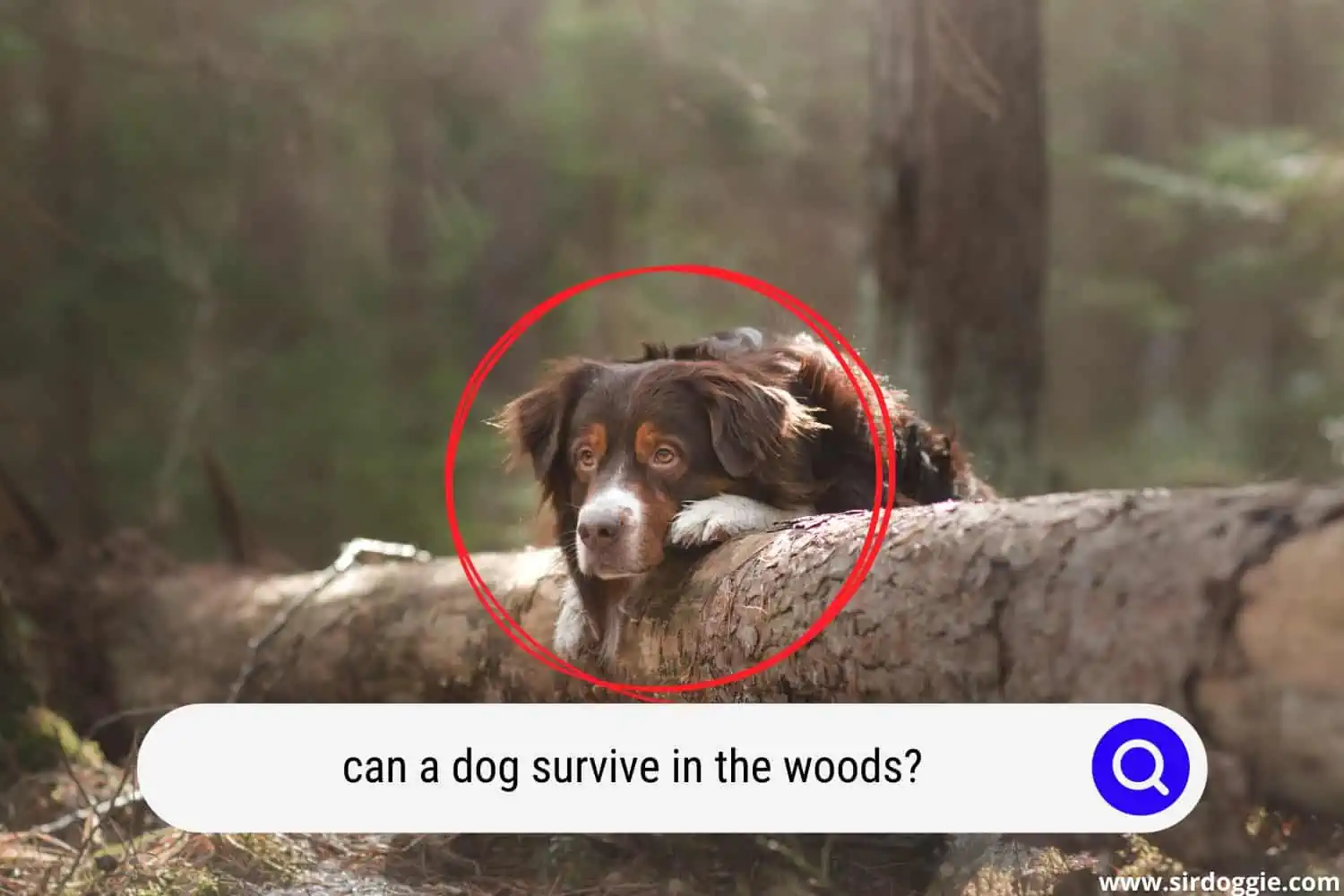How Long Can a Dog Survive in the Woods?
It’s a pet owner’s nightmare: you’re out in a forest camping or hiking, and your dog slips away and doesn’t return. During the initial search, a lot goes through your mind, like, where did it go? Or, eventually, will it be safe until we can locate it?

How long can a dog survive in the woods? A dog could live indefinitely out in the woods, based on a number of factors including size, age, breed, training, weather, and environmental conditions. Domesticated dogs maintain enough age-old instinct to direct them to seek food and water when the body absolutely needs it.
The key to consider initially is, how long can dogs go without food or water. Dogs can go up to a week without food, but only about 3 days without water. So for lost dogs, understand you at least have days to find your pet.
From there it depends on several other factors. Let’s look at them, in case you’re ever facing the prospect of losing a dog in the woods or in the wild.
What Helps a Dog Survive in the Wild?
It’s an understatement to say no dogs are exactly alike. Of course not! Some are big, some are small, others have long hair, or short hair, or hardly any hair at all. If a pooch gets lost in the wild and hasn’t been found before sundown, consider the following:
- Weather. Is the temperature there at that time of year expected to get too cold at night? What kind of an environment did it get lost in? At least in the woods, there should be plenty of shade to help prevent dehydration. Beware of sudden shifts to extreme weather conditions.
- Environment. Aside from shade, is there enough natural water in the area? Hydration might be the single most important element for survival for any animal in the wild. Also, are there any blind cliffs, or loose boulders, in the area? Can it accidentally harm itself?
- Size. Larger dogs can better defend themselves against predators or threats, compared with smaller breeds.
- Breed. Some canine breeds have been involved with running or training for so long, like Huskies, that all the running around while lost is less likely to wear them down. Then there is their fur; in cold climates of course dogs with long hair will fare better. Some breeds are known for being “outdoorsy,” like hunting canines or cattle-herding dogs, and probably will survive better than, say a poodle or chihuahua.
- Health. Was your dog completely healthy before the trip? (If not, ask yourself why you even brought the dog along in the first place).
- Training. Dogs that have been trained extensively over several years should do better out in the woods, as that type of training keeps their mind, and usually also the body, in good shape.

Wildcards for Dogs Lost in the Woods
While dogs have lived with human beings for at least about 10,000 years, along with all that time some instincts faded. However, not all instincts, thankfully.
Dogs can still bury food or treasured items for retrieval later; ascertain when another animal or noise means danger (like with a rattlesnake); or know when to seek shelter for the night.
In fact, some of those items may be “wildcards” in your list of factors affecting a dog’s ability to last in the woods.
Other animals, or dangerous insects, are more prevalent out in the woods or in the wild, compared with home. While your dog may still have some instincts remaining to decide which are dangerous or not, any prolonged confusion in that matter can prove disastrous. Hesitation before a dangerous predator could prove fatal.
Likewise, poisonous plants or fruits, or nasty thorns, can cause illness or injury bad enough to threaten your pet’s life.
Don’t forget about traps, which hunters could lay for other animals ~ not knowing a domesticated pet might be roaming the area.
Importance of Experience and Training for Dog Survival
When even considering taking a dog on excursions deep into the wilderness, it’s very important to think about how much experience the pooch has in uncontrolled situations in environments outside of human structures.
Dogs that have already gone along with groups of backpackers, on long hikes, or even just camping for the weekend once or twice, probably have better odds of surviving longer in the woods.
Exposure breeds familiarity and reduces anxiety. Anxiousness in dogs can cause debilitating behaviors like constant whining, non-stop barking, or walking in circles ~ none of which are helpful out in the woods.
Just a little advanced training, well beyond just the “sit” and “lie down” commands, but some real-time outdoors would help pet dogs get used to the sounds, smells, and movements far from home. Remember those instincts mentioned at the beginning here; eventually, something will trigger your dog’s brain that he or she is in trouble, and then survival instincts take over.
Final Words on Dogs Surviving the Woods
If you lose a dog in the woods, don’t panic. You have at least probably 3 days before your pet might need water, and probably more time than that. Some experts say most lost dogs are found within 12 hours. Even if it takes longer than that, domesticated dogs can go without food for up to 7 days.
Whenever taking pets with you camping or roughing it in the wild, plan ahead. How is your dog’s health? Does his or her veterinarian know the trip’s details? Note the survival factors above and determine whether your pooch might be extra vulnerable should you get separated.
Dogs can survive months, some say even years, in the woods. But not every lost dog situation fares that well. It’s probably wise to know your dog’s particulars, e.g. breed and size, and compare those with the environment you plan to introduce it to.

Family Dog Expert Author
Hi there! I’m Stuart, a devoted dog lover and family dog expert with over a decade of experience working with our furry companions. My passion for dogs drives me to share my knowledge and expertise, helping families build strong, loving bonds with their four-legged friends. When I’m not writing for SirDoggie, you’ll find me hiking, playing with my beautiful dog, or studying music.